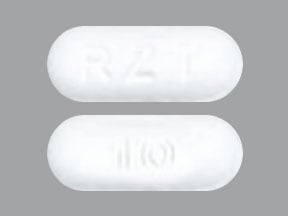
Rizatriptan Coupons & Savings Card – Discount Prices from $6.00
Generic for: Maxalt, Maxalt-mlt
Rizatriptan is a medication used to treat migraine headaches, whether they occur with or without aura, in individuals aged 6 years and older. It is available as a generic tablet and an orally disintegrating tablet that dissolves on the tongue. Rizatriptan belongs to a class of drugs called triptans. It works by activating serotonin receptors in the brain's blood vessels and nerves, which leads to the narrowing of these vessels and reduces the release of proteins that cause inflammation and pain. This action helps alleviate migraine symptoms such as headache, nausea, vomiting, and sensitivity to light and sound, allowing you to resume your usual activities more quickly and potentially reducing the need for other pain relief medications. However, it is important to note that rizatriptan does not prevent future migraines or reduce their frequency. Common side effects may include dizziness, headache, and sleepiness. It is essential to discuss with a healthcare professional before using rizatriptan, especially if you are taking antidepressants or other migraine medications.
Our coupons are free to use. Before paying, show the pharmacist your Rizatriptan savings card to get your free discount. Use our filters below to edit the prescription box to match your needs. The Rizatriptan prices will update based on your prescription needs. Above our Rizatriptan coupons, you can change your location to see pharmacy prices and costs in other areas. We're here to help you buy Rizatriptan at the lowest price with our prescription discount card.
My prescription
Edit
10MG, Rizatriptan (9 Tablets)
Select pharmacy

CVS
$19.55
COUPON PRICE
Walmart
$6.00
COUPON PRICE
Walgreens
$12.59
COUPON PRICE
Albertsons
$18.21
COUPON PRICERizatriptan savings card
Show this card to your pharmacist
Walmart
$6.00
BIN
ID
PCN
GRP
019876
LHA4739722
CHIPPO
LHX
Powered by
Rizatriptan is a medication used to treat migraine headaches, whether they occur with or without aura, in individuals aged 6 years and older. It is available as a generic tablet and an orally disintegrating tablet that dissolves on the tongue. Rizatriptan belongs to a class of drugs called triptans. It works by activating serotonin receptors in the brain's blood vessels and nerves, which leads to the narrowing of these vessels and reduces the release of proteins that cause inflammation and pain. This action helps alleviate migraine symptoms such as headache, nausea, vomiting, and sensitivity to light and sound, allowing you to resume your usual activities more quickly and potentially reducing the need for other pain relief medications. However, it is important to note that rizatriptan does not prevent future migraines or reduce their frequency. Common side effects may include dizziness, headache, and sleepiness. It is essential to discuss with a healthcare professional before using rizatriptan, especially if you are taking antidepressants or other migraine medications.
Our coupons are free to use. Before paying, show the pharmacist your Rizatriptan savings card to get your free discount. Use our filters below to edit the prescription box to match your needs. The Rizatriptan prices will update based on your prescription needs. Above our Rizatriptan coupons, you can change your location to see pharmacy prices and costs in other areas. We're here to help you buy Rizatriptan at the lowest price with our prescription discount card.
More prescriptions for migraine
coupons from$1229.11Save 72%
coupons from$120.81Save 57%
coupons from$28.09Save 95%
coupons from$19.87Save 46%
coupons from$5.98Save 87%
coupons from$30.18Save 77%
coupons from$1343.48Save 37%
coupons from$25.32Save 76%
More prescriptions for migraine
Trudhesa Save 72%coupons from $1229.11
Treximet Save 57%coupons from $120.81
Frovatriptan Save 95%coupons from $28.09
Amitriptyline Save 46%coupons from $19.87
Celecoxib Save 87%coupons from $5.98
Dihydroergotamine Save 77%coupons from $30.18
Botox Save 37%coupons from $1343.48
Propranolol ER Save 76%coupons from $25.32
Rizatriptan dosage forms
Use our Rizatriptan 5MG coupon with prices from $2.99 for 1 Tablet. You can also use our Rizatriptan 5MG coupon with prices from $6.91 for 9 Tablets. We have a Rizatriptan 5MG coupon with prices from $8.38 for 12 Tablets. You can use our Rizatriptan 5MG coupon with prices from $11.32 for 18 Tablets.
Dosage Quantity Price from Per unit 5MG 1 Tablet $2.99 $2.99 5MG 9 Tablets $6.91 $0.77 5MG 12 Tablets $8.38 $0.70 5MG 18 Tablets $11.32 $0.63 10MG 9 Tablets $6.00 $0.67 10MG 1 Tablet $2.89 $2.89 10MG 12 Tablets $7.17 $0.60 10MG 18 Tablets $9.50 $0.53
| Dosage | Quantity | Price from | Per unit |
|---|---|---|---|
| 5MG | 1 Tablet | $2.99 | $2.99 |
| 5MG | 9 Tablets | $6.91 | $0.77 |
| 5MG | 12 Tablets | $8.38 | $0.70 |
| 5MG | 18 Tablets | $11.32 | $0.63 |
| 10MG | 9 Tablets | $6.00 | $0.67 |
| 10MG | 1 Tablet | $2.89 | $2.89 |
| 10MG | 12 Tablets | $7.17 | $0.60 |
| 10MG | 18 Tablets | $9.50 | $0.53 |
